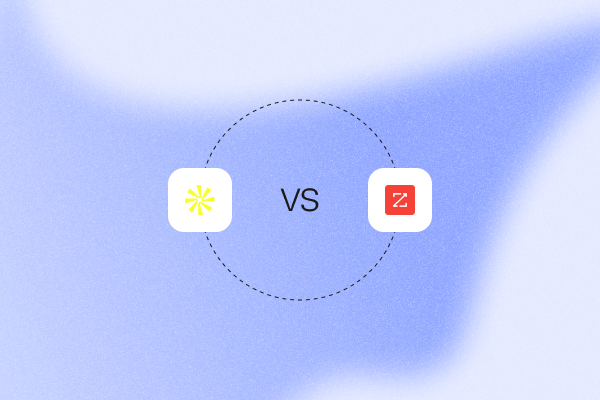Looking to understand the differences between Apollo.io and ZoomInfo? Both tools are great for lead generation, but they have distinct strengths.
In this post, we’ll break down their key features, pricing, and data quality to help you choose the right tool for your needs.
Whether you’re focusing on budget, depth of data available, or ease of integration, we’ll provide a detailed comparison so you can make the best choice for your business.
TL;DR
- Apollo.io is a great option for small to mid-sized teams seeking a budget-friendly CRM tool with lead generation and engagement features.
- ZoomInfo offers more detailed data accuracy, market insights, and enterprise-level lead intelligence, but it is more expensive and best suited for larger teams.
- If you’re after fresh, real-time data, consider PhantomBuster for its flexible automation and real-time scraping from platforms like LinkedIn.
| Feature | Apollo.io | ZoomInfo | PhantomBuster |
| Free Trial | Yes, Free Plan | No | Yes |
| Standard Plan Cost | Starts at $59/user/month | Starts at $14,995/year | $56/month |
| Database Size | 275+ million contacts, 73 million companies | 321+ million contacts, 105 million companies | Extract live data to build fresh leads databases |
| Primary Focus | Lead generation & sales engagement | Lead generation & intent data | Lead generation & intent data |
| Data Quality | Large database, weaker email/phone accuracy | Stronger in the U.S., 30-40% may need updates | 100% accurate real data |
| Geographic Focus | Global, with stronger U.S. coverage | Primarily U.S. market, limited in Europe | Anywhere |
| Key features | – Automated email sequences – CRM integrations with Salesforce & HubSpot – Advanced job title and company filtering – Actionable analytics & prospect scoring – End-to-end sales workflows |
– Buyer intent data and site visit alerts – CRM integration with Salesforce & Dynamics – Advanced lead filtering & data enrichment – Firmographic and technographic insights – Real-time data alert |
– Real-time data scraping – Pre-built automations – Extract data from LinkedIn, Slack, Google Maps, etc – 1000+ data points – AI features for list cleaning and outreach personalization |
| CRM Integration | Salesforce HubSpot |
Salesforce Dynamics HubSpot |
HubSpot Pipedrive Salesforce |
| Lead Enrichment | Basic lead enrichment | Advanced lead enrichment Buyer signals |
Advanced lead enrichment AI enrichment |
| Intent Data | Limited, data from LeadSift, no real-time data | Intermediate, bidstream data, no real-time | Real-time intent data |
| Engagement Tools | Email sequencing, call automation | No built-in engagement features | Automated Outreach, Automated Social Media Engagement |
| Pricing Model | Flexible, various plans | Customizable pricing | Monthly or Annually |
What is Apollo.io?
Apollo.io is a data enrichment tool that helps you gather and refine lead information based on contact databases.
With access to over 275 million contact records, Apollo lets you find quality leads by filtering based on revenue, funding, and job roles. It integrates with Salesforce and HubSpot, keeping your CRM data updated and actionable.
If you want to optimize your outreach, Apollo.io provides the data and analytics to improve response rates and close more deals.
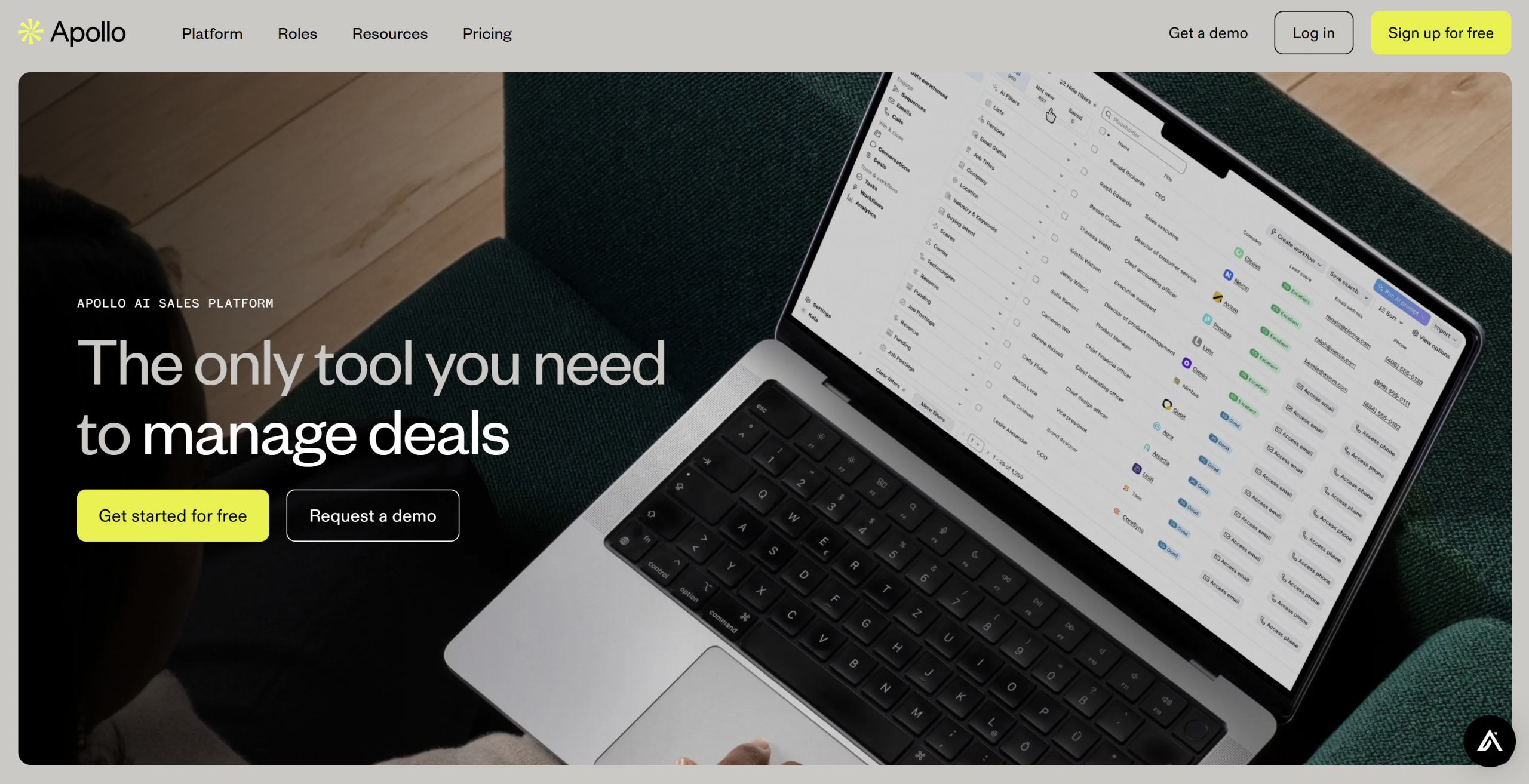
What is ZoomInfo?
ZoomInfo offers access to an extensive database of over 220 million contacts to help you find qualified leads.
It provides detailed insights into prospects, like buying signals and company profiles, so you can focus on the right people.
You can connect it to your CRM to keep your lead data organized and accurate for better targeting.
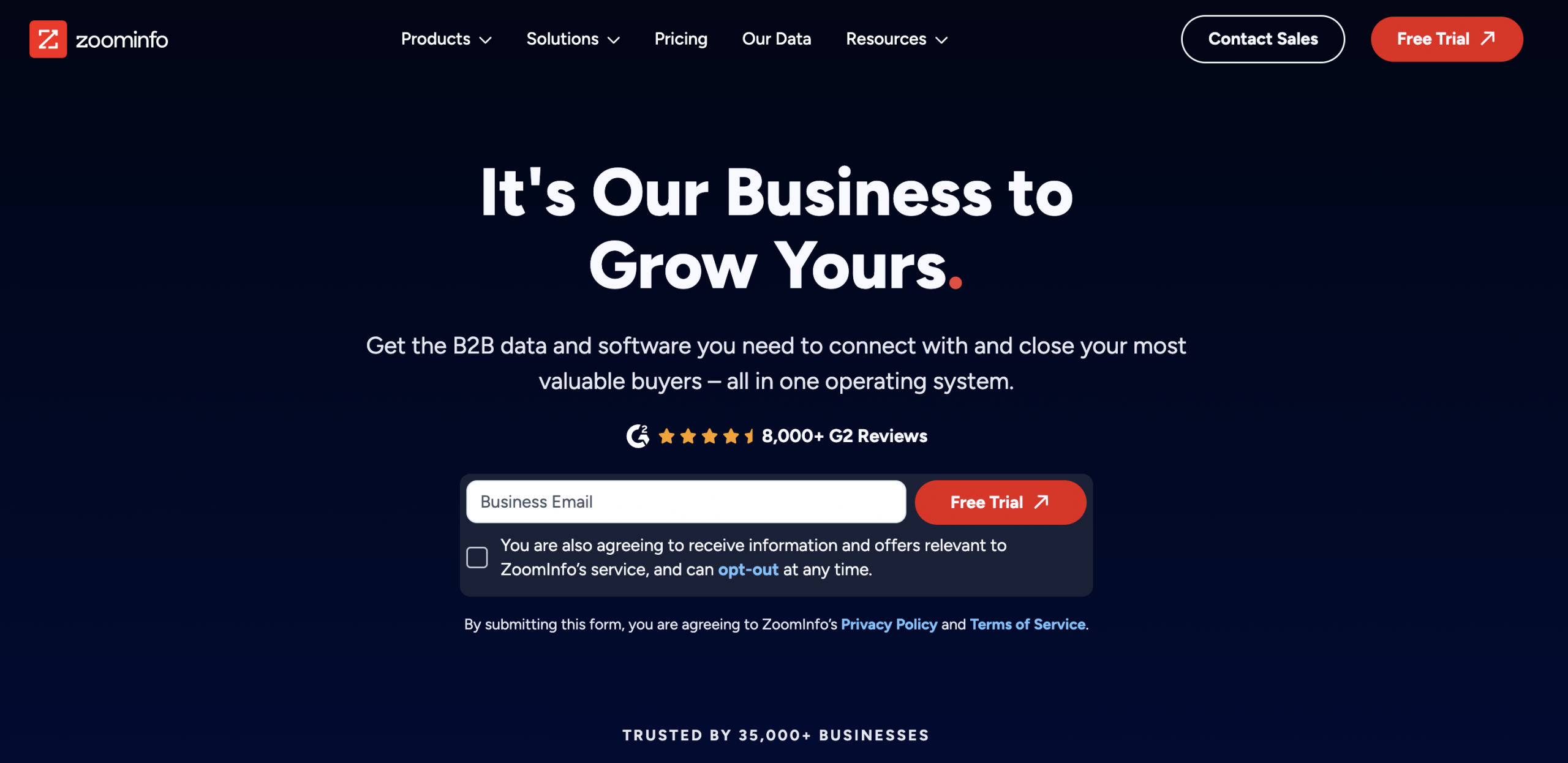
Apollo.io vs. ZoomInfo data quality and coverage
Apollo.io and ZoomInfo offer similar services but gather and manage their contact data differently inside large databases, impacting the data’s reliability and up-to-dateness.
And this can impact your sales results.
A recent comparison found that Apollo.io struggles with email verification and missing cell phone numbers. At the same time, ZoomInfo needs to improve its global reach, especially in Europe, and refresh contact data more often.
No provider is perfect, but knowing each one’s strengths and weaknesses can help you choose the one that best meets your needs.
Apollo.io data quality
Although Apollo.io offers an extensive database with over 275 million contacts, the data quality can be inconsistent.
Some users find that email verification isn’t always reliable, and direct phone numbers are sometimes missing. Industry clustering could also be stronger compared to other tools.
Apollo is aware of these gaps and is actively working to improve the accuracy of its data, ensuring better verification and more reliable contact details over time.
Zoominfo data quality
ZoomInfo is known for having massive data sets, especially in the U.S., but it could do better globally—particularly in Europe.
Users report that some contact information can be outdated or inaccurate, requiring extensive manual updates. Despite this, ZoomInfo’s data offers valuable insights into buyer intent and company-level details.
They regularly refresh their database, but keeping everything entirely accurate remains challenging, especially with a large volume of information.
How much data do Apollo.io and ZoomInfo offer?
Apollo.io provides access to over 275 million contacts and 73 million companies. It uses various data sources, including a contributor network, email engagement, public data crawling, and third-party providers.
ZoomInfo, on the other hand, boasts over 321 million contacts and 105 million companies globally. It pulls data from web crawling, user contributions, and various partners, focusing strongly on U.S. data.
ZoomInfo vs Apollo.io intent data
Let’s start by noting that ZoomInfo and Apollo.io primarily collect names, emails, and phone numbers—not intent data.
So, if you need detailed intent data, like who’s engaging with your social media posts, you’ll probably need another tool.
That being said, another significant difference between Apollo vs ZoomInfo is the way they collect data:
- ZoomInfo relies on machine learning and bidstream data to provide insights about sites visited, but it’s not always updated in real time. It’s clearly not enough for a sales strategy based on intent.
- Apollo.io partners with LeadSift to pull and verify data from sources like social media, blogs, and forums.
Ultimately, both platforms lack real-time tracking, so capturing fresh buyer intent is hard.
ZoomInfo vs Apollo.io compliance
Both ZoomInfo and Apollo.io take compliance seriously:
- GDPR: Both tools comply with GDPR to ensure data privacy for European users.
- CCPA: ZoomInfo and Apollo.io comply with CCPA, protecting data rights for California residents.
- DNC list cleaning: Both platforms offer DNC list cleaning, ensuring that you follow telemarketing regulations and avoid non-compliant outreach.
Apollo.io vs. ZoomInfo integration capabilities
Apollo.io and ZoomInfo offer seamless integrations, but their focus areas differ.
Apollo.io prioritizes streamlining your workflows with tools like Salesforce, HubSpot, Gmail, and LinkedIn. Through Zapier, it also connects with a wide range of apps, making it flexible for teams looking to optimize basic sales processes.
ZoomInfo, meanwhile, emphasizes data-driven insights. It integrates with CRMs like Salesforce and Microsoft Dynamics and tools like Slack for real-time alerts. This makes it ideal for companies focused on advanced targeting and personalization.
Pricing comparison
Pricing is key when choosing between Apollo.io and ZoomInfo for your tech stack. The two platforms operate on subscription models, with monthly or annual plans, but the structure and cost vary significantly.
ZoomInfo pricing
ZoomInfo offers custom pricing with personalized plans, but you must contact sales for details. RevPilots says ZoomInfo starts at $14,995 a year, with a two-year minimum.
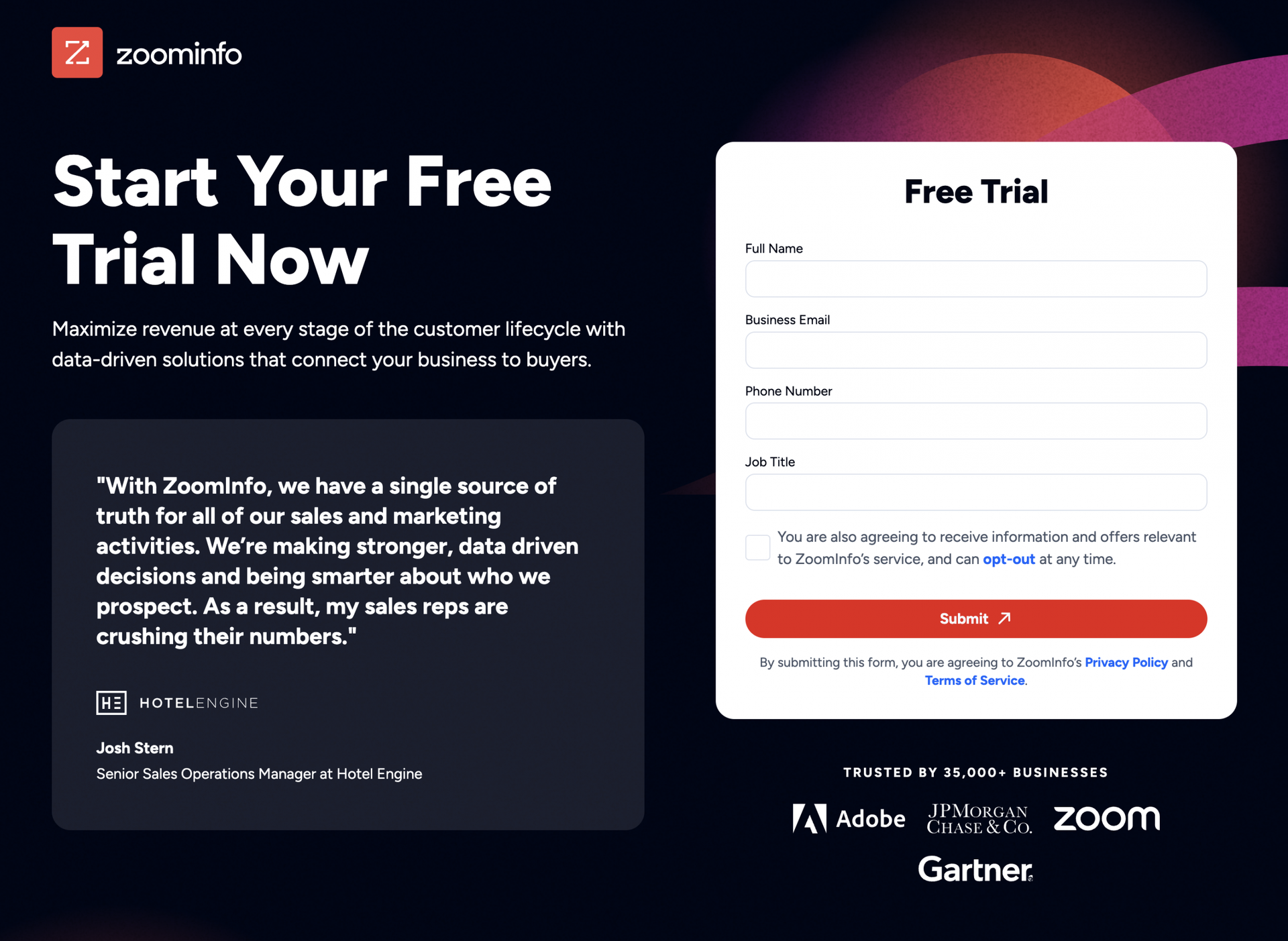
Apollo.io pricing
Apollo offers 1 free plan and 3 paid plans:
- Free plan: Basic features, ideal for small teams or individuals, 5 mobile credits/month.
- Basic plan: $59/user/month, includes more credits for outreach and integrations.
- Professional plan: $99/user/month, adds advanced reports, higher limits on credits.
- Organization plan: $149/user/month, SSO, security features, customizable reports for large enterprises.
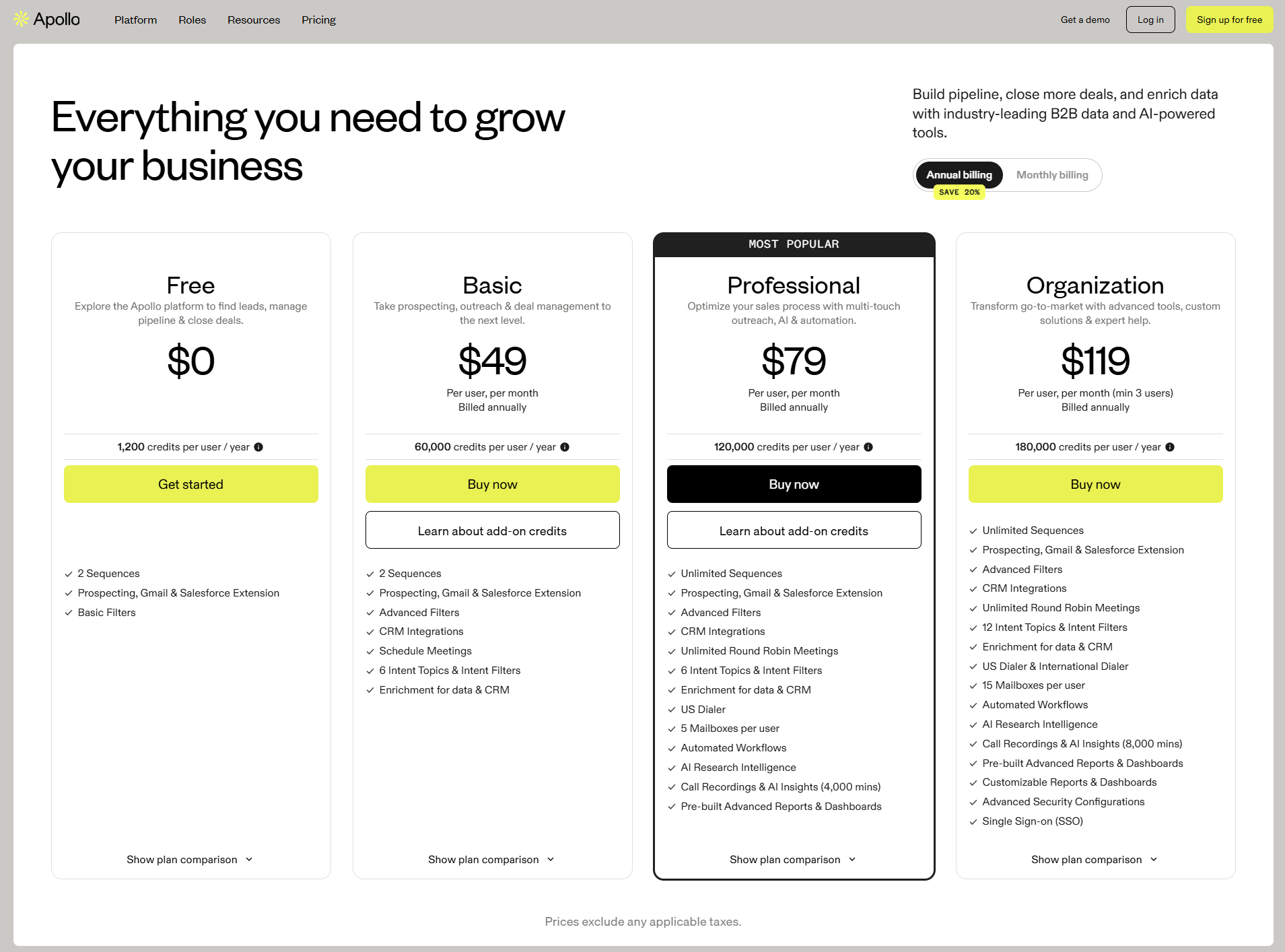
Apollo.io reviews: What users say
Let’s check some of the latest reviews.
“Good for a start but needs utilities.”
Apollo was the first programme I used to access contact records. I liked the Chrome extension feature for its ability to find companies and contacts when browsing LinkedIn and company websites. It saves a lot of time.
But sometimes it can give false information. Information about the companies and what they do is not sufficient. Cannot integrate with all CRMs.
Plus, I am having problems with mail integration. Outgoing mails usually appear as spam and my mail address is changed to a random one.
Ömer D., Sales Development Specialist for a mid-market brand.
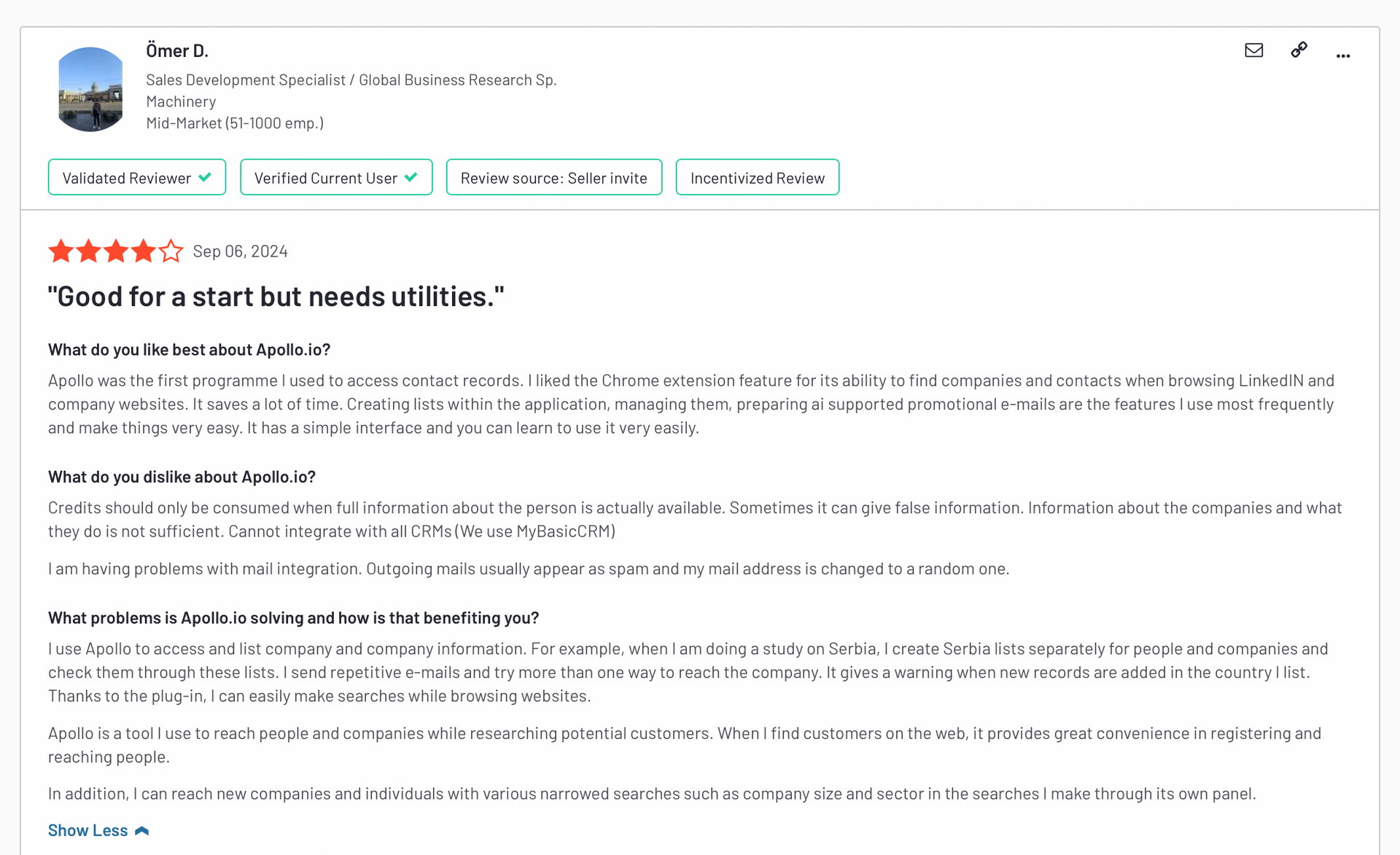
“Not as comprehensive / reliable as some other solutions”
Extension is easy to use. Great value for price point.
But Apollo doesn’t have email search functionality: Therefore one has to search a prospect by first name, last name, and company. This requires a lot more typing and manual effort compared to just copying and pasting a unique email address.
Also, it doesn’t capture all online data: I frequently bump into situations where a phone number or email is not present on Apollo, but a quick browse on the company website and it’s there.
This makes the Apollo search less reliable compared to some other solutions I’ve worked with.
Richard L., Business Development Rep of a small business.
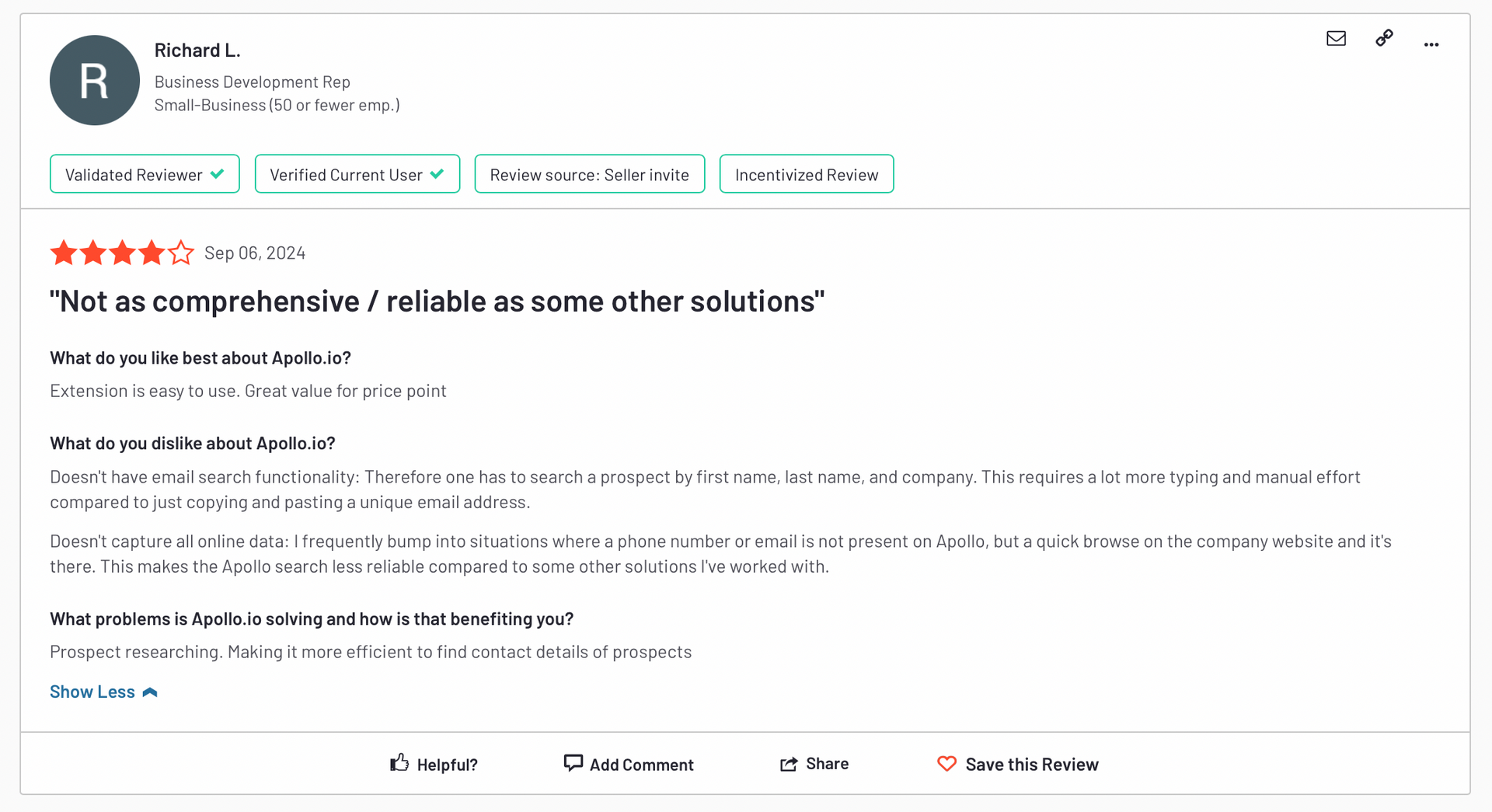
ZoomInfo reviews: What users say
“Tons of important info, but slow”
The most helpful thing about Zoominfo is the information on prospects it provides. I really like how you can find out where every location of a company is, the phone numbers and emails of prospects, etc.
Something I dislike the most is sometimes ZoomInfo can run really slowly. I feel like it takes more time out of my day to do prospecting sometimes because of how slow it is responding.
Jake B., Business Development Representative for a mid-market company.
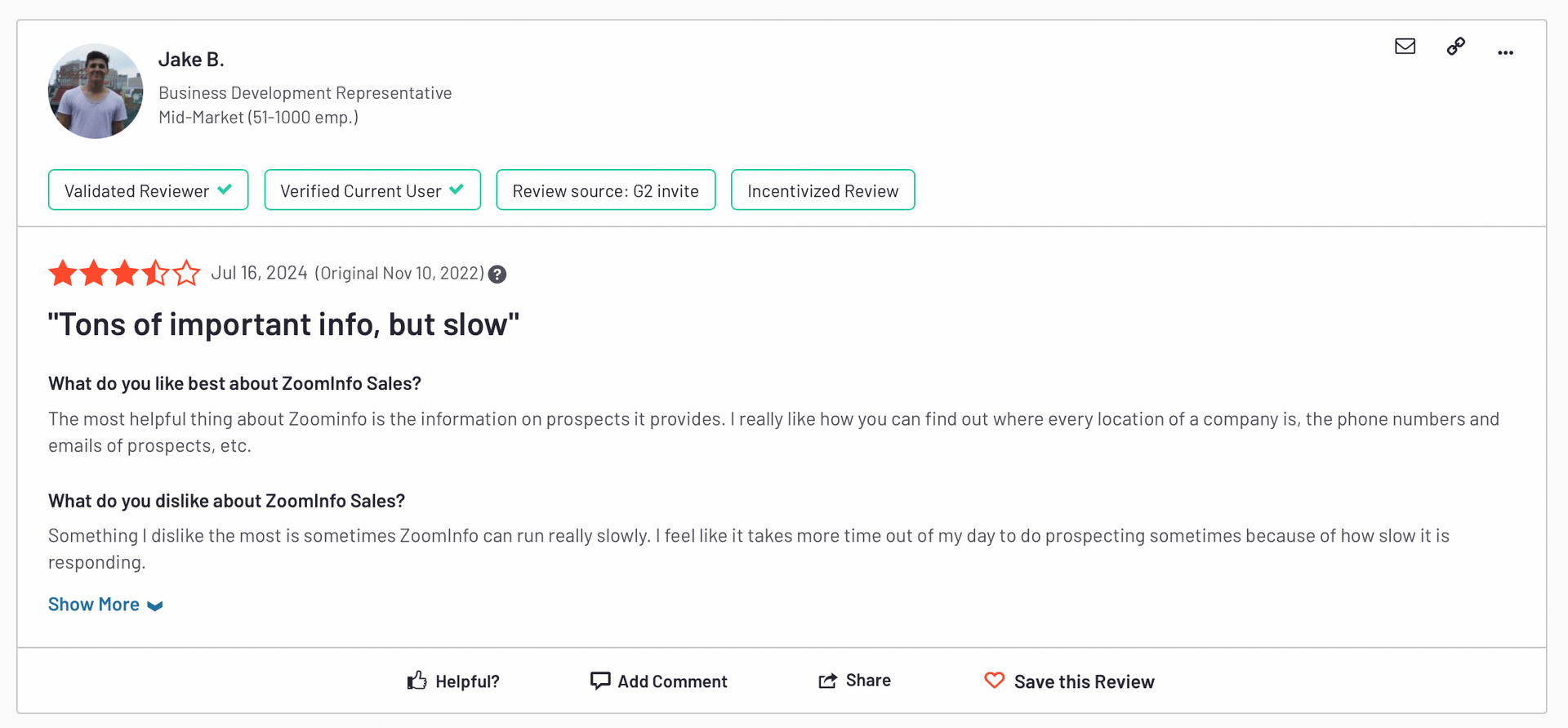
“Not As Advertised / Incredibly Unstable”
I like the ability to port it out to software that functions.
But the ZoomInfo Chrome extension didn’t work for a business quarter that we had it and it looks like it well preceded that looking at reviews online. Our computer system with 32GB of memory was crashing while using ZoomInfo and had to be disabled.
The contacts largely go to receptionists and not the advertised contacts. Our own agency has over 8-year-old out-of-date information on ZoomInfo. I don’t know where they get their data from but it’s clearly very outdated.
Highly deceptive company I couldn’t recommend you put your advertising dollars into. We will likely sue for damages.
Adam H., founder of a small business.
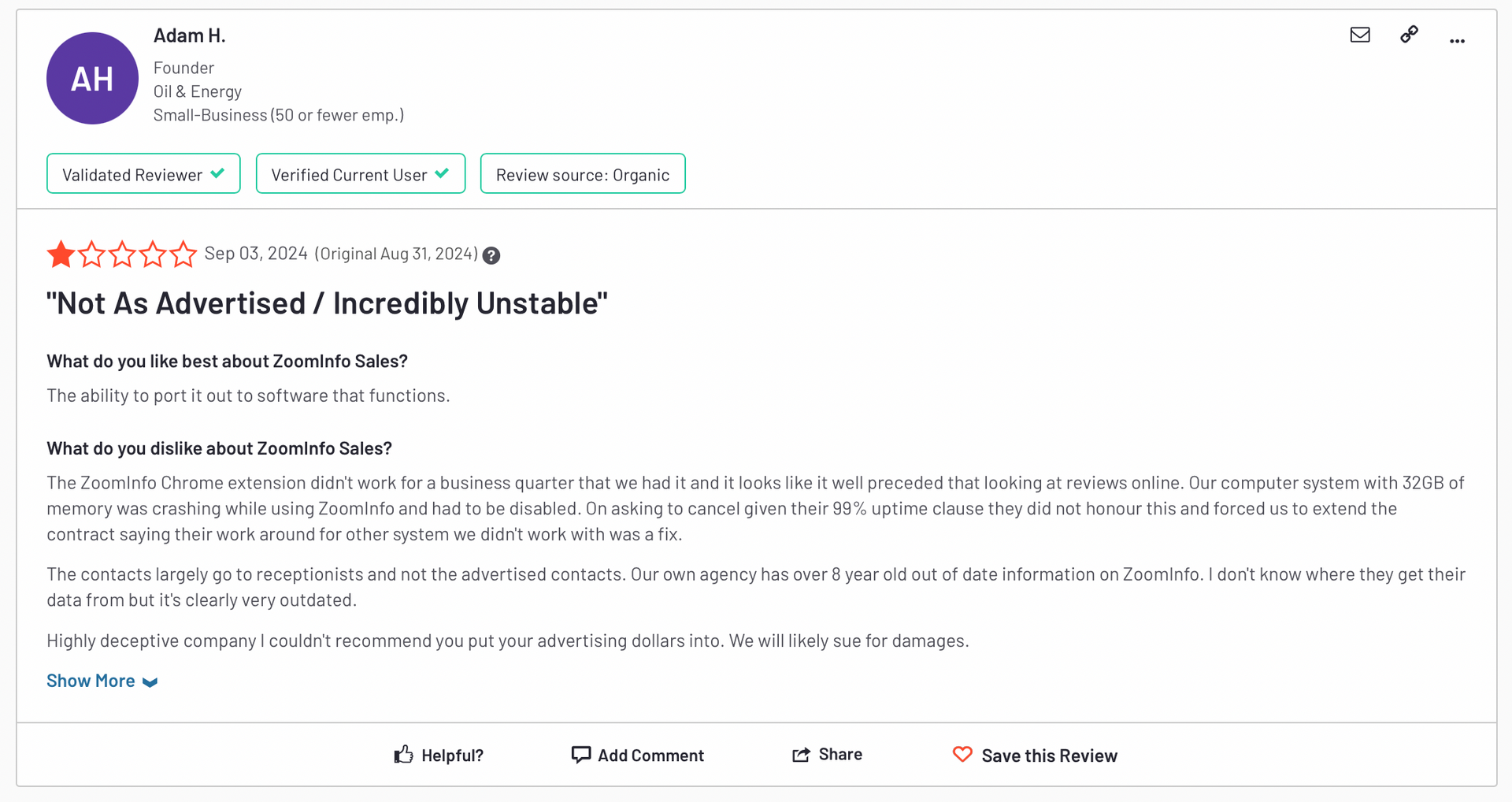
Sales engagement feature comparison
Apollo.io and ZoomInfo both offer helpful features to empower sales teams, but they focus on different strengths.
Apollo.io features for sales teams
- Automated email sequences: Create tailored follow-ups and monitor engagement.
- CRM sync: Integrates smoothly with Salesforce and HubSpot.
- Lead engagement: Direct outreach via email, phone calls, and job title filtering.
- Insightful analytics: Track open rates, calls, and meetings to refine outreach.
- Prospect scoring: Prioritize leads based on likelihood to convert, helping your sales team to focus on high-potential deals and better lead routing.
ZoomInfo features for sales teams
- Intent data: Detect buyer signals and activity to engage at the right time.
- CRM integration: Works with Salesforce, Dynamics, and other major platforms.
- Advanced lead filtering: Filter leads by intent and other firmographics.
- Detailed performance insights: Evaluate engagement and track results across channels.
- Real-time alerts: Stay updated on prospects showing buying signals through search topics and site visits.
Apollo.io or ZoomInfo: Which is better?
When comparing Apollo.io and ZoomInfo, it mainly comes down to what you need from a sales tool:
- Target zone: Both platforms are better suited for US-based data, while other tools are preferred for Europe and the UK.
- Data quality: ZoomInfo delivers more accurate, in-depth data with advanced lead intelligence and market research capabilities.
- Pricing: Apollo.io is more budget-friendly, making it ideal for smaller teams or businesses with lighter needs.
- Engagement features: Apollo.io includes email sequencing and prospecting tools. ZoomInfo, while lacking those features, excels at data enrichment and lead insights.
Final verdict: Apollo.io is the best choice if you’re looking for affordable, essential features. ZoomInfo is the go-to for superior data accuracy and lead depth.
Apollo and ZoomInfo alternative: Get fresh data
When getting fresh data for lead generation, real-time scraping is more effective for intent signals.
This allows you to capture live interactions and up-to-date data from platforms like LinkedIn:
- Get data from event attendees: Extract details of people attending LinkedIn events for targeted outreach.
- Scrape leads from LinkedIn profile posts: Scrape data from those who liked or commented on LinkedIn posts to find active prospects.
- Connect with profiles from a LinkedIn search: Automate connections from search results, maximizing prospect engagement.
These insights provide fresher and more relevant data compared to static databases.
PhantomBuster: automation platform for sales teams
If you’re looking for fresh data and real-time automation, PhantomBuster is worth considering.
Unlike Apollo, PhantomBuster scrapes live data directly from LinkedIn and other platforms, so your pipeline is always current.
Here’s what PhantomBuster brings to the table:
- Real-time LinkedIn scraping: Grab the most current leads directly from LinkedIn without relying on stale databases.
- Pre-built automations: Over 100 automation workflows are available to enrich leads and automate outreach.
- HubSpot integration: Seamlessly push and pull data across all plans.

- Multi-platform outreach: Automate outreach via LinkedIn, Twitter (X), and Instagram.
- AI-powered data enrichment: Leverage AI to enrich your data and gather deeper insights.
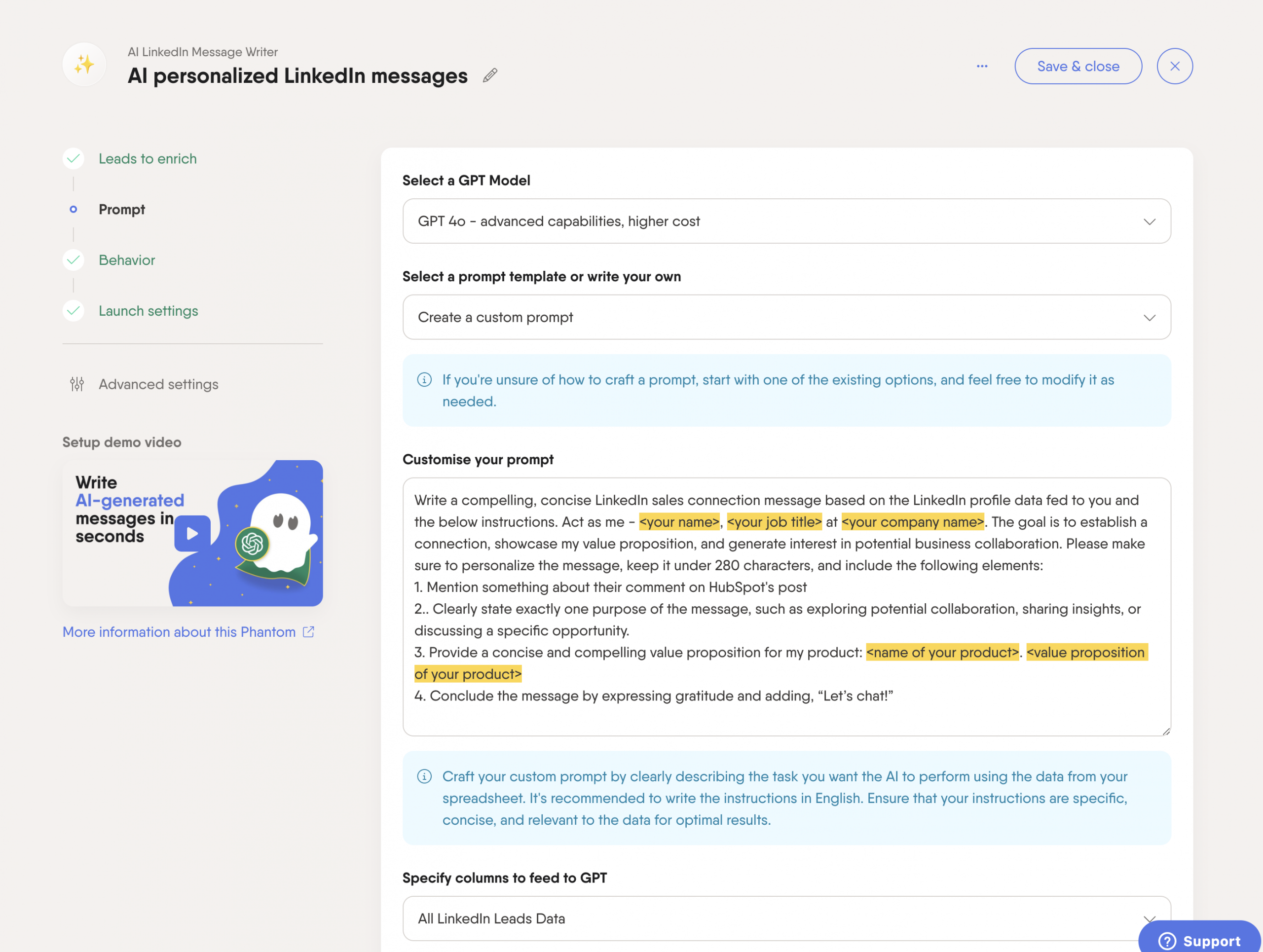
Pricing: PhantomBuster offers a 14-day free trial, with plans starting at $56/month on an annual plan.
Conclusion
Both Apollo.io and ZoomInfo offer valuable lead generation tools with some advanced features, but the right choice depends on your specific needs:
- Choose Apollo.io if you’re looking for a cost-effective solution for lead generation and basic sales engagement or a more straightforward platform for small to mid-sized teams.
- Pick ZoomInfo if your sales team needs deeper insights, more accurate data, and advanced B2B sales intelligence, especially if you’re targeting enterprise-level prospects.
If you’re looking for fresh, real-time data scraping and flexible automation workflows, PhantomBuster is an excellent alternative. Get a free 14-day PhantomBuster trial and get quality leads!
